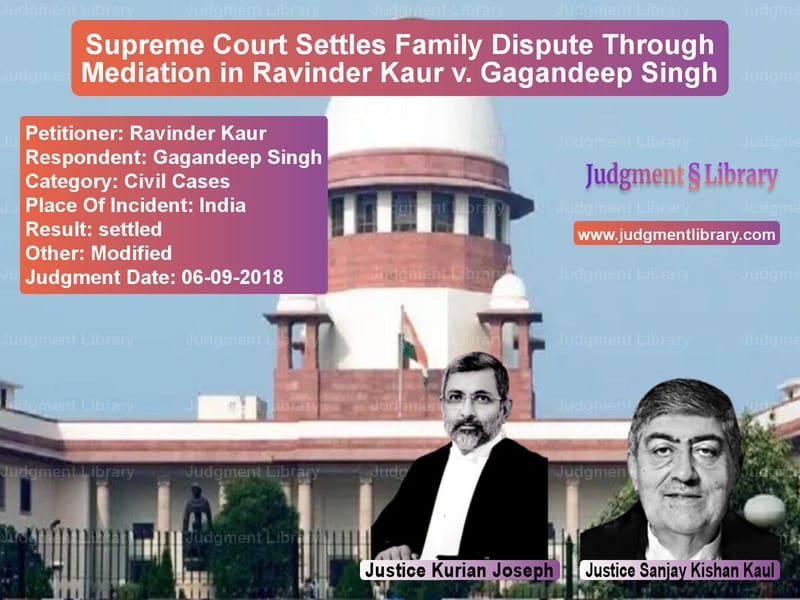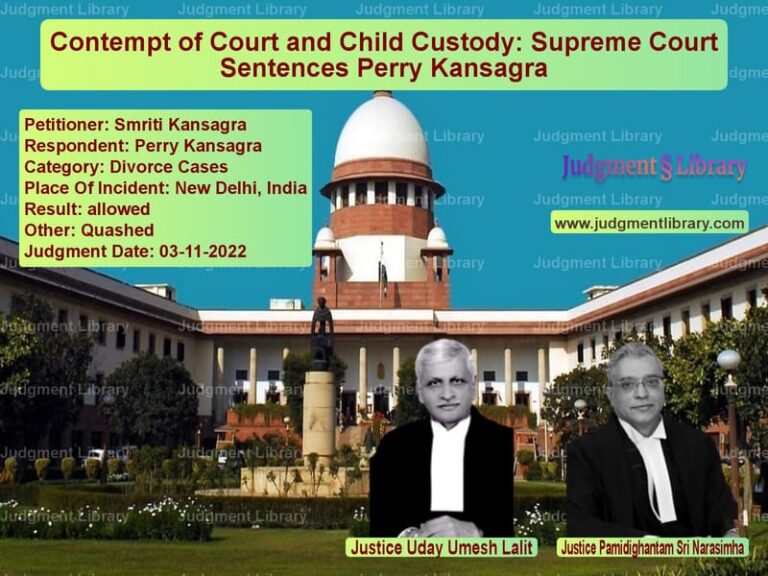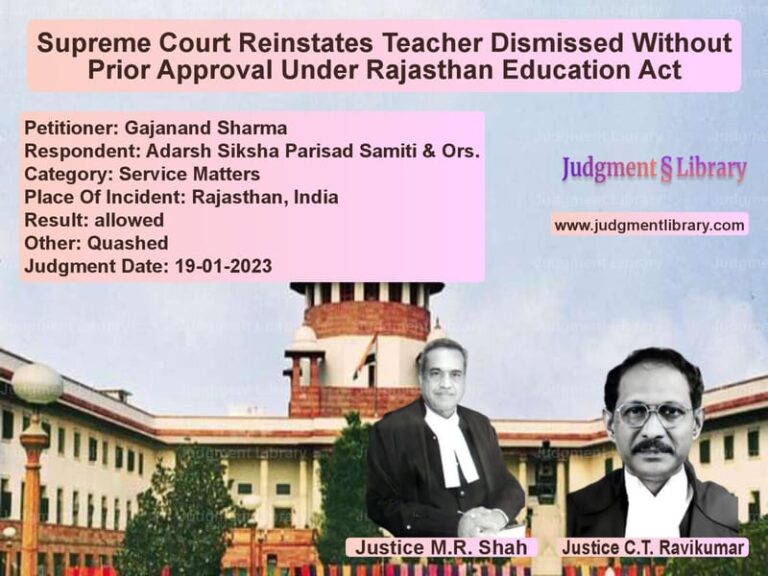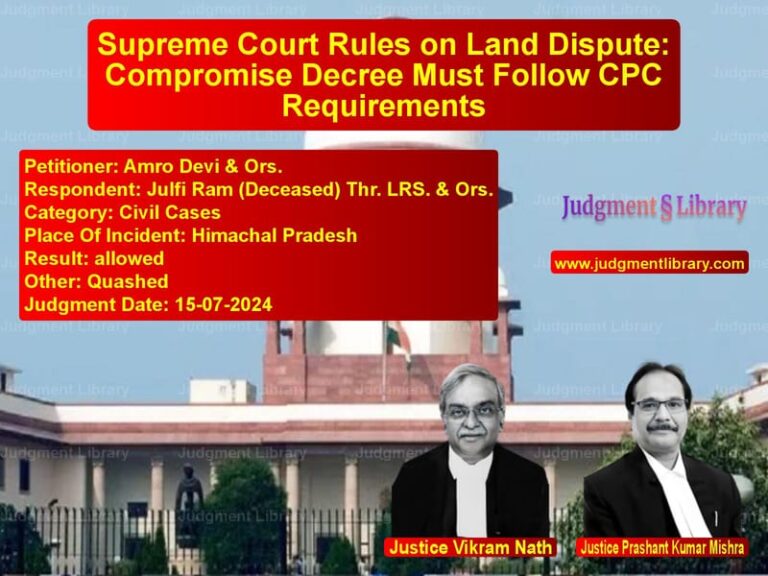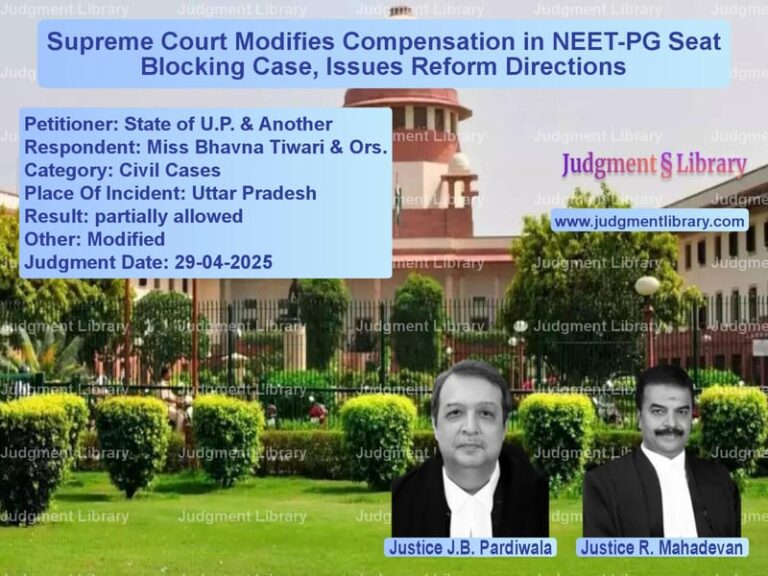Supreme Court Settles Family Dispute Through Mediation in Ravinder Kaur v. Gagandeep Singh
On 6th September 2018, the Supreme Court of India delivered a landmark judgment in the case of Ravinder Kaur v. Gagandeep Singh. This case revolved around a long-standing family dispute over property division and financial matters that had lasted for more than **two decades**. Recognizing the potential for an amicable resolution, the Court facilitated a **mediation process** to settle the matter outside of prolonged litigation.
The Supreme Court’s decision highlighted the importance of **alternative dispute resolution (ADR)** mechanisms, particularly mediation, in resolving family conflicts. The ruling provided clarity on property rights while ensuring that the parties reached a mutually agreeable solution.
Background of the Case
The dispute between **Ravinder Kaur (appellant)** and **Gagandeep Singh (respondent)** had persisted in various courts for over twenty years. The case involved **partition of family property, financial disputes, and inheritance issues** among close family members.
The litigation had reached a stage where multiple suits were pending before the **High Court**. Sensing the potential for a settlement, the Supreme Court, on 4th July 2016, issued an order stating:
“We are of the view that the minor difference of opinion between close family members should be settled amicably, and we see no reason why it could not be settled amicably with a solution acceptable to both sides.”
Following this direction, the case was referred to the **Supreme Court Mediation Centre** for resolution.
Mediation Proceedings
On 8th July 2016, the parties attended mediation sessions at the **Supreme Court Mediation Centre**. Despite several rounds of discussions, an initial resolution was not achieved.
On 20th March 2017, the matter returned to the Supreme Court, where **senior counsel Gopal Subramaniam** was appointed as a mediator. With sustained efforts, the mediator facilitated discussions, addressing various financial and property-related concerns.
On 5th September 2018, a comprehensive **settlement report** was submitted to the Supreme Court, documenting the agreement reached between the parties. The Court recorded this settlement as part of its final decree.
Petitioner’s Arguments (Ravinder Kaur)
The petitioner, **Ravinder Kaur**, presented the following arguments:
- The disputed **property belonged to the family**, and an equitable division was necessary.
- Past financial transactions **were not settled properly**, leading to unfair treatment.
- Litigation had dragged on for **too long**, affecting the family’s financial stability.
Respondent’s Arguments (Gagandeep Singh)
The respondent, **Gagandeep Singh**, countered with the following points:
- The **legal ownership of the disputed property** was already established.
- Past financial agreements had been **executed fairly**, and further claims were unnecessary.
- The **court-ordered mediation was an opportunity to settle** without further legal battles.
Supreme Court’s Observations
The Supreme Court, comprising **Justice Kurian Joseph and Justice Sanjay Kishan Kaul**, examined the mediation report and made the following key observations:
On the importance of mediation:
“Thanks to the cooperation extended by both parties, all disputes have been amicably settled. The learned mediator has submitted a comprehensive report which shall form part of this judgment.”
On property division and financial settlement:
“These appeals are disposed of in terms of the settlement as recorded in paragraph 20 of the Report, which is acceptable to both the parties. All other litigations referred to in paragraph 14 are also disposed of in terms of the settlement.”
On tax implications:
“The payments referred to in paragraph 20 of the Terms of Settlement, being part of a partition among family members, shall not attract any tax by way of capital gains.”
Final Judgment
The Supreme Court ruled:
- The **settlement agreement recorded in paragraph 20** of the mediator’s report was final.
- All ongoing **litigations between the parties were disposed of** based on the agreement.
- The settlement was **binding and enforceable** under the law.
- The financial transactions within the agreement **would not attract capital gains tax**.
The Supreme Court also acknowledged and **appreciated the efforts of senior advocate Gopal Subramaniam**, stating:
“We record our sincere appreciation for the strenuous efforts taken by Mr. Gopal Subramaniam, who has spent months in discussions with the parties and was finally able to persuade them to settle.”
Impact of the Judgment
The Supreme Court’s ruling in this case establishes a strong precedent for **mediation and alternative dispute resolution (ADR)** in family disputes. The key takeaways include:
- Promoting mediation: Courts encourage families to resolve disputes through **mutual agreement rather than prolonged litigation**.
- Legally binding settlements: Mediated agreements, once accepted by the Court, carry **the same legal weight as a formal decree**.
- Tax exemption for family settlements: Property divisions among family members **do not attract capital gains tax**.
- Judicial efficiency: Encouraging settlements helps **reduce the burden on courts** and ensures quicker resolutions.
The decision highlights the **Supreme Court’s proactive role** in ensuring that families do not suffer prolonged litigation when an **amicable resolution is possible**. This judgment reinforces the effectiveness of **mediation as a viable alternative to adversarial litigation**, particularly in civil and family disputes.
Petitioner Name: Ravinder Kaur.Respondent Name: Gagandeep Singh.Judgment By: Justice Kurian Joseph, Justice Sanjay Kishan Kaul.Place Of Incident: India.Judgment Date: 06-09-2018.
Don’t miss out on the full details! Download the complete judgment in PDF format below and gain valuable insights instantly!
Download Judgment: Ravinder Kaur vs Gagandeep Singh Supreme Court of India Judgment Dated 06-09-2018.pdf
Direct Downlaod Judgment: Direct downlaod this Judgment
See all petitions in Contract Disputes
See all petitions in Property Disputes
See all petitions in Succession and Wills
See all petitions in Judgment by Kurian Joseph
See all petitions in Judgment by Sanjay Kishan Kaul
See all petitions in settled
See all petitions in Modified
See all petitions in supreme court of India judgments September 2018
See all petitions in 2018 judgments
See all posts in Civil Cases Category
See all allowed petitions in Civil Cases Category
See all Dismissed petitions in Civil Cases Category
See all partially allowed petitions in Civil Cases Category

